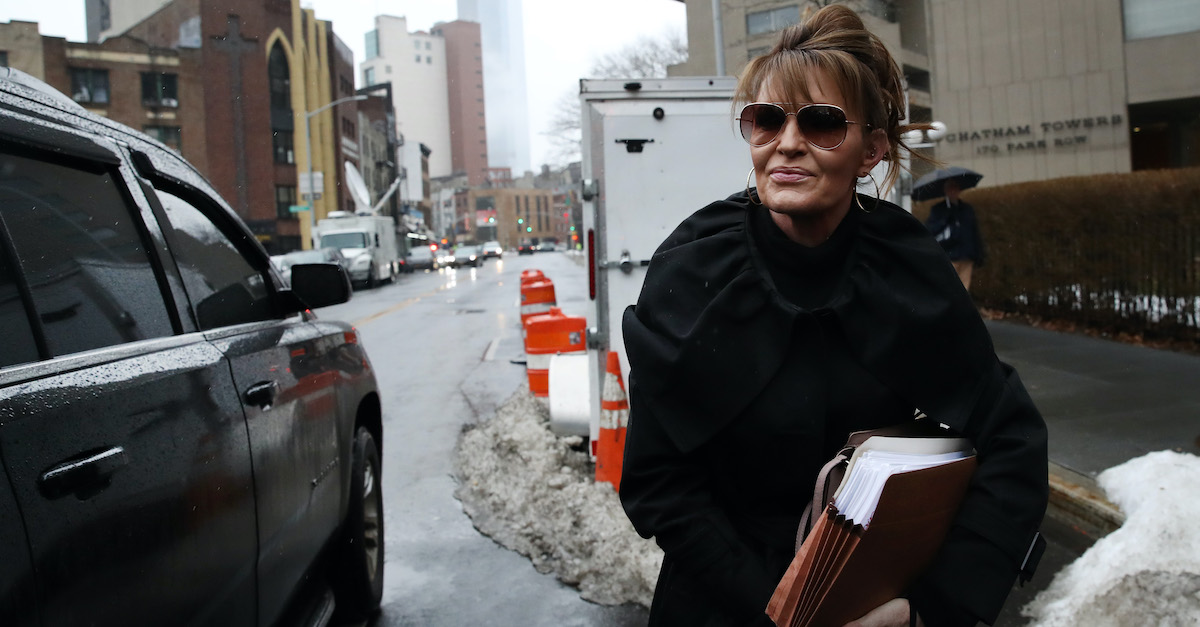
NEW YORK, NEW YORK – FEBRUARY 03: Former Alaska Governor Sarah Palin arrives at a federal court in Manhattan to resume a case against the New York Times after it was postponed because she tested positive for Covid-19 on Feb. 3, 2022 in New York City.
Former Alaska Gov. Sarah Palin (R) “wholly failed” to prove her defamation case against the New York Times “even to the minimum standard required by law,” a federal judge wrote in a scathing opinion, explaining his fateful order to toss the case in the middle of deliberations.
Now seeking a new trial, Palin’s attorneys want to scrap the jury’s “not liable” verdict amid revelations that “several” jurors learned about the case’s dismissal through smartphone push notifications while deliberations were ongoing. They also want to disqualify Senior U.S. District Judge Jed Rakoff, who was adamant that that this development was meaningless and “legally irrelevant.”
“Although these jurors were adamant that this knowledge had not affected their determination of the verdict in the slightest, the Court promptly notified the parties of this information,” his opinion states.
Rakoff emphasized his “firm view” that the jurors’ awareness that he dismissed the case “did not nullify the jury’s verdict in any respect.”
“Even if one indulges the implausible hypothesis that the jury would have returned a verdict for Palin absent the news alerts, the operative final judgment would still have been the same: dismissal of Palin’s claim as a matter of law,” he added.
The detailed and extensively footnoted opinion explains why Rakoff found that Palin did not meet the high bar under defamation law for “actual malice,” established by the watershed Supreme Court precedent Times v. Sullivan. Press freedom advocates fear that Palin filed her case to advance a conservative agenda—expressed by former President Donald Trump and floated by two current Supreme Court justices—of loosening U.S. libel law.
In a footnote, Rakoff nodded to that possibility.
“Palin has consistently maintained that New York Times v. Sullivan either is no longer good law or does not apply to this case, and thus that the First Amendment does not require her to prove that Defendants published with actual malice,” he wrote. “The Court has repeatedly rejected these contentions, which are fully preserved for appellate review.”
To prevail in court under the current standard, Palin had to prove that former Times editor James Bennet acted with reckless disregard for the truth when he wrote in an editorial that the “link to political incitement was clear” between a graphic disseminated by her political action committee and the 2012 massacre perpetrated by Jared Lee Loughner. Sarah PAC had circulated a map with crosshairs over the congressional districts of 20 Democrats, including that of one of Loughner’s victims, Arizona Rep. Gabrielle Giffords. It was never established that Loughner saw the map, let alone acted upon it.
The Times corrected the editorial “America’s Lethal Politics,” striking the offending line with a lengthy correction, some 12 hours later.
Rakoff found that no reasonable jury could have found that Bennet knew the phrase was likely false before publishing it.
“Had [Bennet] known or suspected the information was false before publication, he likely would have been defensive, avoided issuing a correction to the Editorial, or tried to minimize the correction’s confession of error,” the judge noted.
Palin’s attorney Shane Vogt did not immediately respond to Law&Crime’s email requesting comment.
Read the ruling, below:
(Photo by Spencer Platt/Getty Images)